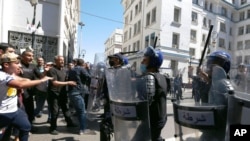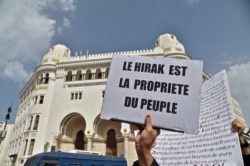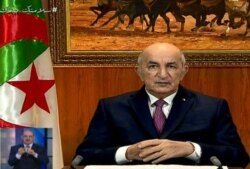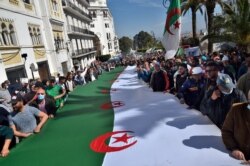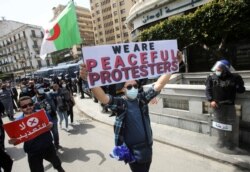Protests banned and political activists and journalists detained. Lawyers and judges reprimanded or otherwise targeted, ostensibly for their ties to a grassroots protest movement demanding profound political change.
As Algeria readies for legislative elections this month, the government is tightening its grip, rights groups and others say, with a raft of detentions and even prison sentences against its rainbow of critics. In the capital, Algiers, and other cities, authorities have effectively banned weekly demonstrations organized by the two-year-old Hirak protest movement, largely by placing administrative hurdles.
If today the government crackdown gives its leaders a tenuous upper hand, it risks backfiring in the longer term, experts warn, further dampening an anticipated low voter turnout in the June 12 parliamentary vote, deepening the country's social and economic crisis and fueling new support for the Hirak movement.
"There's a fundamental contradiction," said Brahim Oumansour, North Africa specialist at the Paris-based French Institute of International Relations think tank. "Authorities are searching for political legitimacy through the elections, but paradoxically this repressive policy contributes to perpetuating the crisis."
Rights concerns
Rights groups say Algerian authorities have arrested thousands of peaceful demonstrators since February, when members of the Hirak movement returned to the streets after months of coronavirus-imposed restrictions. Reports say many protesters were released, but others were held for questioning or faced legal action.
Ahead of the legislative polls, "the efforts have intensified, including against peaceful protests and protesters," according to a joint press statement Tuesday by several prominent rights groups, including the Paris-based International Federation for Human Rights and the World Organization Against Torture, in Geneva.
The United Nations' human rights office has also raised concerns, saying reported attacks on peaceful assembly and free expression were reminiscent of the state's previous heavy-handed responses.
Algiers is pushing back. In an interview published Wednesday by France's Le Point magazine, President Abdelmadjid Tebboune suggested the Hirak movement had lost its legitimacy, and that voters were keenly interested in the upcoming vote — despite a chunk of the opposition boycotting it — "especially the young."
"There's a minority who refuse the election," he told Le Point, adding, "I think all Algerians should express themselves, but I refuse the diktat of a minority."
An old story
In many ways, it seems Algeria is reliving an old narrative, analysts say, despite hopes for change in 2019. As ailing longtime leader Abdelaziz Bouteflika sought a fifth term in office, millions took to the street in protest, giving birth to the Hirak movement. Bouteflika was ousted, as the street movement profoundly unsettled but did not destroy a power system in place since Algeria's 1962 independence.
The country's powerful military subsequently jailed and sidelined many in Bouteflika's government, including his brother. Tebboune, 75, was elected to office in December 2019, but with official voter turnout at just 40%. He promised change, despite being a fixture of the regime, serving as minister of housing and prime minister under Bouteflika.
Eighteen months later, some analysts say there has been little beyond rhetoric and cosmetic tinkering. Ordinary Algerians are underwhelmed and disenfranchised. A referendum on the country's new constitution last November drew another record low turnout.
For Algeria's opposition, "the main problem is that the system is the same," said analyst Michael Ayari at the International Crisis Group. "It's not because there has been a constitutional change, or reassuring declarations, or democratic language in the Constitution promising more liberties, at least on paper, that the system has changed."
Adding to the government's worries are a deepening economic crisis, aggravated by the coronavirus pandemic and shrinking oil revenues. Also, there are broader regional instabilities, with massive Algeria bordering the restive Sahel, Western Sahara and Libya.
"After more than 18 months of Tebboune's presidency, the results are very mediocre in terms of political, social and economic reforms," said analyst Oumansour.
Now, he added, "the government faces pressures from the army to organize elections, regardless of the price, to give the appearance of relative stability, to put an end to Hirak and the demonstrations."
A second wind?
For its part, the Hirak has seen its numbers dwindle from the millions of 2019 to tens of thousands today, with street protests vanishing completely last year, once the coronavirus pandemic struck. Many supporters have taken to the internet instead. But the movement remains unstructured and leaderless.
In recent weeks, they have been increasingly targeted in police crackdowns. Journalists, opposition leaders and civil society members have also been detained and sometimes imprisoned, rights groups say. Among them, journalist Kenza Khatto of Radio M, a media outlet considered close to the Hirak movement, who was given a suspended sentence after covering the protests.
On Sunday, a prominent judge, Saadedine Merzoug, was ousted from the country's magistrate's body, Agence France-Presse reported, ostensibly for his pro-Hirak rulings.
Meanwhile, Algeria's military released a documentary last month suggesting a mix of interests — from independence fighters from its northeastern Kabylia region, to French public television and Morocco — were plotting against the state.
"It's always the same discourse," said analyst Ayari, summing up the government's reaction. "That they're a power surrounded by agents hostile to the revolution, and foreign agents who want to destroy Algeria."
Meanwhile, Hirak leaders are calling on voters to boycott the legislative vote, in their demand for a broad political overhaul. Some expect a record number of independent candidates to run, although it's unclear how independent they will be. A number of leftist opposition parties say they will boycott the vote.
"The specter of abstention really worries the political leaders," said expert Oumansour. "It helps explain the crackdown. Another major abstention vote in these legislatives will be seen as a failure of the regime's road map — and it risks breathing new life into the protest movement."




